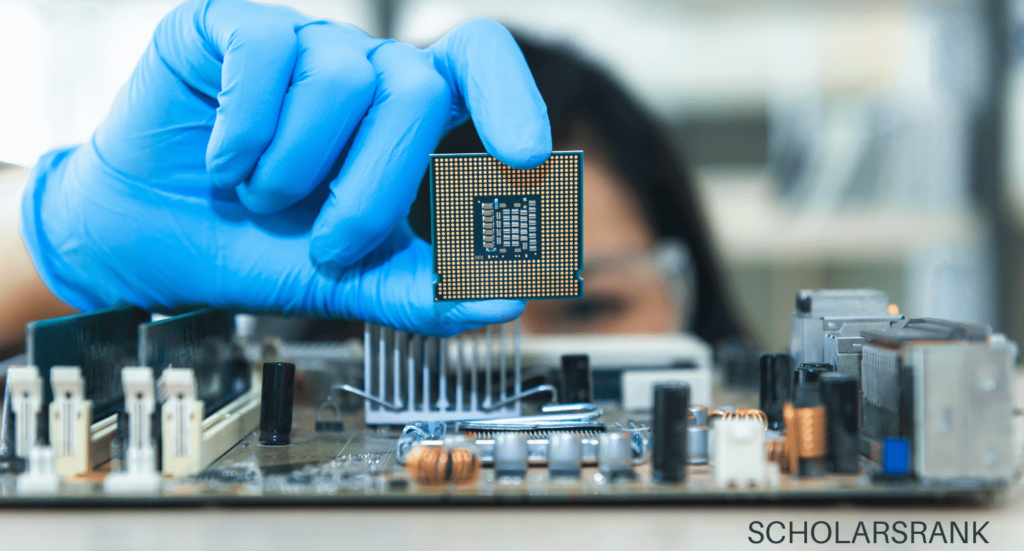Introduction
Is a masters in computer engineering worth it? A satisfying method to develop your career and boost your earning potential is to acquire a master’s in computer engineering.
The master’s degree program for computer engineering duration is usually two years and the course is offered by many institutions. These degrees are available for students to seek professions in sustainable, useful technology. Computer engineering differs from its near relative, computer science, which places more emphasis on theoretical knowledge, due to the field’s practical character.
As of 2019, the Bureau of Labor Statistics (BLS) reported that the median annual compensation for computer hardware engineers was $117,220. However, as there is a lot of rivalry for places in computer engineering, graduates who want to work in specialized, high-paying fields increasingly need to get a master’s degree.
The degree requirements, selection standards, and career options for engineers in the sector are all thoroughly covered in this article.
What Is Computer Engineering?

Computer engineering is a relatively new technological subject, having its roots in the 1940s. It took several years to construct the Atanasoff-Berry Computer, the first electronic digital computer, which utilized a combination of electrical engineering, physics, and mathematics.
Computer engineering has advanced quickly over the last few decades to become a crucial sector for both corporations and consumers. As of May 2019, the BLS reported that over 71,000 Americans were employed as computer hardware engineers. In specialized fields including software, electronics, robotics, and quality assurance, thousands of other computer engineering experts work.
A passion for computer hardware, software, and applications tends to draw problem-solvers to the field of computer engineering. Their interests in electronics, robotics, aircraft, and computer design are all very different.
Hardware (physical components) and firmware utilized in a variety of domains, including consumer electronics, medical equipment, communication systems, airplanes, self-driving cars, and others, are created by computer engineers using principles from computer science and electrical engineering.
The development, prototyping, and testing of microchips, circuits, processors, conductors, and every other component utilized in computer systems are skills that computer engineering students master (e.g. supercomputers, smartphones, laptops, servers, IoT gadgets). They also produce firmware, a crucial form of software that enables operating systems and programs to fully utilize the hardware.
The rivalry for some jobs in the technology sector has been fiercer as a result of growth that has been slower than typical. While many positions in computer programming and engineering just demand a bachelor’s degree as a prerequisite, having a master’s degree boosts a candidate’s chances of getting hired.
Graduates with master’s degrees in computer engineering have a significant impact on how commercial technology, consumer electronics, and scientific research will develop over the coming years.
Computer Engineering skills
You need to acquire or enhance skills like the following to be successful as a computer engineer:
- Analytical thinking
- Problem-solving
- Creativity
- Critically analyzing
- Observation of details
- Specialized writing
- Programming
Computer engineers employ these abilities to discover novel solutions that increase the speed, security, and power efficiency of our systems. If you’ve ever wondered why modern phones and laptops perform better than older models, it’s because more effort has gone into building quicker components, as well as operating systems and programs that are more optimized.
Why Acquire a Master in Computer Engineering?
The question “Is a masters in computer engineering worth it? ” is frequently asked by prospective students. A graduate degree might be a wise investment for the appropriate candidate.
A master’s in computer engineering offers a more comprehensive knowledge foundation and skill set that graduates can apply to their job searches than other popular post-baccalaureate choices, such as coding boot camps. Programs in computer engineering integrate instruction in advanced mathematics, physics, electrical engineering, and programming.
The top advantages of a master’s in computer engineering include:
- Network Expansion
A strong professional network can lead to unexpected employment possibilities, job advancement, and professional development. You have the priceless chance to network with students, teachers, and professionals in the field while earning a master’s degree in computer engineering.
- Various Career Possibilities
You can compete for positions at major computer design companies working with microprocessors, robots, mobile technology, and academic research by completing a master’s program in computer engineering.
- Earnings Prospects
Many talented applicants aspire to secure rewarding positions in computer engineering. You can more effectively compete for these positions if you have a master’s degree. The median annual salary for the top 10% of computer hardware engineers is above $185,000.
What To Anticipate From Master’s Programs In Computer Engineering
Master’s degrees in computer engineering enhance undergraduate knowledge, develop practical skills, and broaden career options. Advanced computer architecture, computer networks, and electrical circuits are all covered in the course material.
About 30 graduate-level credits are needed for a master’s degree in computer engineering. Most full-time students complete their degrees in two years. Although total completion time varies depending on the number of courses taken each semester, part-time students typically take longer to get their degrees.
Some master’s degrees in computer engineering provide alternatives for specialization in fields like networks or software engineering. In the absence of focused emphasis, students select electives based on their academic and professional interests.
The price of a master’s degree in computer engineering varies depending on the region and whether it is a public or private institution, among other things. Private universities do not have greater tuition costs for out-of-state students while charging less per credit on average than public universities.
Benefits of Studying Computer Engineering Master’s Degree
You can find entry-level employment in computer engineering with a bachelor’s degree. A master’s degree, meanwhile, can prepare you for managerial roles and better-paying work at bigger companies.
A master’s degree can also be a stepping stone to doctoral degrees and positions as a researcher or teacher in higher education.
If you are an engineering graduate, you might wish to research on-campus tuition. Following that, you can continue your studies in a comfortable setting. On the other hand, distance learning enables you to continue working at your current position while continuing your degree.
The majority of master’s students in the program for computer engineering already possess a bachelor’s degree in a relevant field. Because of this, these programs frequently omit foundational courses in favor of in-depth training on complex subjects.
Numerous programs offer career guidance, which could involve finding employment for an internship to obtain practical experience. The program might continue to get in touch with alumni to advertise coaching or job opportunities.
The basis of a professional network that will help you in your profession is established by your professors and peers.
Master’s in Computer Engineering Admission Requirements
Master’s degree programs in computer engineering typically have identical entry requirements. A bachelor’s degree in electrical engineering, computer engineering, or a closely related STEM discipline is sometimes required of applicants.
In addition, some universities demand that the bachelor’s degree an applicant submits be ABET-accredited.
Depending on the institution, each candidate’s transcripts must show that they have a minimum GPA of 3.0-3.5. Many master’s degree programs in computer engineering require GRE scores, however, prospective students can look for universities without this requirement.
A CV, a personal statement, and letters of recommendation are frequently requested by programs. When you apply, be ready to pay a nonrefundable processing fee. Different schools have different deadlines; some only take new students once a year, while others do so continuously.
Degree Options For Masters In Computer Engineering
The average graduate degree for a student interested in computer engineering is a master of science (MS) or master of engineering (MEng). With a few significant exceptions, both curricula offer to learn comparable outcomes.
| Broad Focus | Goals for the future | Capstone/Thesis Requirements |
| The Masters is designed as a stand-alone degree in computer engineering. An MEng is typically advertised in schools as an engineering degree with a concentration in computer engineering. | For students who desire to use their knowledge to pursue particular jobs, the MEng is a terminal professional degree that is perfect. Depending on the institution, a Masters Degree may place more emphasis on research for those pursuing PhDs or on hands-on learning environments for those pursuing jobs in business. | A Master degree program may offer a non-thesis track or require a thesis, depending on the school. Although these students may need to complete internships before graduating, MEng degrees rarely require thesis projects. |
Difference Between Masters In Computer Engineering And Masters In Computer Science
Computer science and computer engineering are closely related fields with some significant parallels and distinctions. Both fields cover complex areas of computer architecture and operation. In contrast, computer science degrees place more of an emphasis on theoretical understanding than degrees in computer engineering.
Consider pursuing a degree in computer engineering if you’re interested in the electrical, mathematical, and physical components of computer systems. Computer science is frequently chosen by those who enjoy abstract ideas, programming, and software development.
Key distinctions and similarities include:
| Parameters | Masters in computer engineering | Masters in computer science |
| Admission requirements | Typically requires a bachelor’s degree in computer engineering and a minimum GPA of 3.0–3.5. | Commonly calls for a bachelor’s degree with a minimum GPA of 2.0-3.0 in a related STEM subject. |
| Program length | When enrolled in school full-time, two years | When enrolled in school full-time, two years |
| Program goal | Prepares students for careers in quality assurance, hardware engineering, and software engineering | Prepares students for employment in scientific research, database management, and software development |
| Specializations | Although not usually available, some alternatives for concentrations includeSoftware and data engineering Networks and embedded systems. | Commonly available concentrations; well-liked choices include NetworkingCybersecurityMachine LearningData Science |
Popular Master’s Degree Courses In Computer Engineering
Master’s degrees provide more flexibility and customization choices than undergraduate programs.
Students pursuing a master’s degree in computer engineering usually enroll in foundational courses that address network and computer architecture principles. The remainder of their course work focuses on their professional interests and offers possibilities to study power electronics, digital communication, and data security.
Typical courses in a master’s program in computer engineering include:
- Computer Architecture
The foundational concepts of computer system design and organization are covered in this course. The course material covers storage systems, memory mapping and hierarchies, basic and advanced pipelining, and CPU construction and operation. Learners acquire the fundamental information and abilities for computer design through a combination of discussion, analysis, and practical projects.
- Electronic Materials
For those who create hardware, this course is essential. It gives a general review of the various varieties of solid materials and their mechanical, electrical, optical, and thermal properties.
- Fundamentals of Machine Learning
This course provides an introduction to artificial intelligence and shows how supervised, semi-supervised, and unsupervised machine learning can be used to address problems in the real world. Learning model complexity, evaluation, selection, and using probability and statistics to handle ambiguous data are common themes.
- Information Theory and Coding
In this course, students learn the basics of information theory and how it applies to data transmission and compression. Information measurements, channel capacity, and theoretical coding constraints are all covered in the course material.
- Communication system
This course provides knowledge of communication system approaches and procedures. Through texts, conversations, and lab work, students delve into topics including sampling, encoding, and the comparison of coherent and noncoherent detection systems.
- Computer Communication Networks
For computer engineers interested in communication and network systems engineering, this course offers advanced knowledge. Routing and flow control, wide area networks, protocol standards, and local and metropolitan area networks are some of the topics covered. Through readings in recent literature, students research novel networking ideas and emerging technology.
- Advanced VLSI Design
The concepts and processes of the conceptual and physical design of VLSI technology are introduced to computer engineers in this course. Testability, performance assessment, and industrial VLSI software are typical themes. Students learn through construction and simulation because most coursework is project- and lab-based.
Career Options for Masters in Computer Engineering
Graduates have a variety of master’s degree options in computer engineering, including programming, video game design, electrical engineering, and scientific research.
Although several of the following careers only require a bachelor’s degree for entry-level employment, a master’s degree in computer engineering increases one’s hiring potential, allows for specialized work, and frequently leads to greater salaries.
As of 2019, the median yearly wage for computer programmers was $86,550, whereas the more difficult tasks performed by electrical, software, and hardware engineers brought in median yearly wages of at least $100,000. Professionals in computer engineering can pursue jobs in research and information science if they have the necessary skills and knowledge.
- Computer and Information Research Scientist
To address both new and persistent challenges, computer and information researchers create theories and new computing paradigms. These experts focus on issues unique to their fields of business, science, and medicine. To study problems and come up with answers, this multifaceted vocation necessitates both practical and abstract activities.
- Computer Programmer
The software control code is created and tested by computer programmers. To write new code, update existing code, and correct problems, programmers need to be fluent in multiple computer languages. A degree in computer engineering gives you the necessary programming abilities and other knowledge for writing software.
- Computer Hardware Engineer
Computer hardware engineers conduct research, design, development, and testing on the actual hardware that makes up computers. Creating schematics, updating hardware to interface with modern software, and managing manufacturing are common jobs. Engineers in this field develop products with embedded computer chips, such as mobile phones, medical equipment, automobiles, and home appliances.
- Electrical Engineer
Electrical engineers plan, create, test, and manage the production of electrical equipment. These experts carry out intricate calculations, finish design jobs, and guarantee that projects adhere to product specifications. The transferrable abilities required to excel in the development of non-computer electronics, such as GPS devices and communications systems, are provided by a master’s degree in computer engineering.
- Software Engineer
Software engineers assist in translating the concepts of designers into program functionalities during the design and development phases of software development. Analyzing user demands, working with programmers and design teams, and mapping out activities using diagrams and models are common duties. Operating systems, video games, and apps are just a few of the areas in which software engineers could specialize.
Conclusion
Is a masters in computer engineering worth it? Yes, a master’s in computer engineering is worth it since it is the key to success. Graduate students can develop their knowledge and competency after earning a degree in computer engineering, as well as their critical thinking and problem-solving skills. They can also be successful in one of the industries that is growing the fastest.
Select the ideal course if you are serious about mastering your field.
Frequently Asked Questions(FAQs)
Is A Master’s In Computer Engineering Worth It?
- Yes. In an industry that is becoming more and more competitive, the best master’s programs in computer engineering can help you stand out. As of 2019, the BLS reports that the median wage for computer hardware engineers was $117,220.
How Useful Is A Master’s Degree In Computer Engineering?
- Programming, electrical engineering, and math skills are all part of a master’s in computer engineering. After graduating, you may be able to find work designing hardware, software, firmware, and other parts of computer systems.
Which Degree Is Best For Computer Engineering?
- A master’s degree in computer engineering combines computer science and electrical engineering coursework. The ability to construct and program microprocessors, integrated circuits, and other physical systems is a competence that graduates have.
Is Computer Engineering A Rewarding Profession?
- Yes, but it’s also demanding. Computer engineering is a lucrative career, but there is fierce competition, particularly for entry-level positions. Computer engineers have a wide range of specialized employment options from which to choose to follow their passion.
You can also read, “Is A Masters In Biomedical Engineering Worth It In 2022?“








